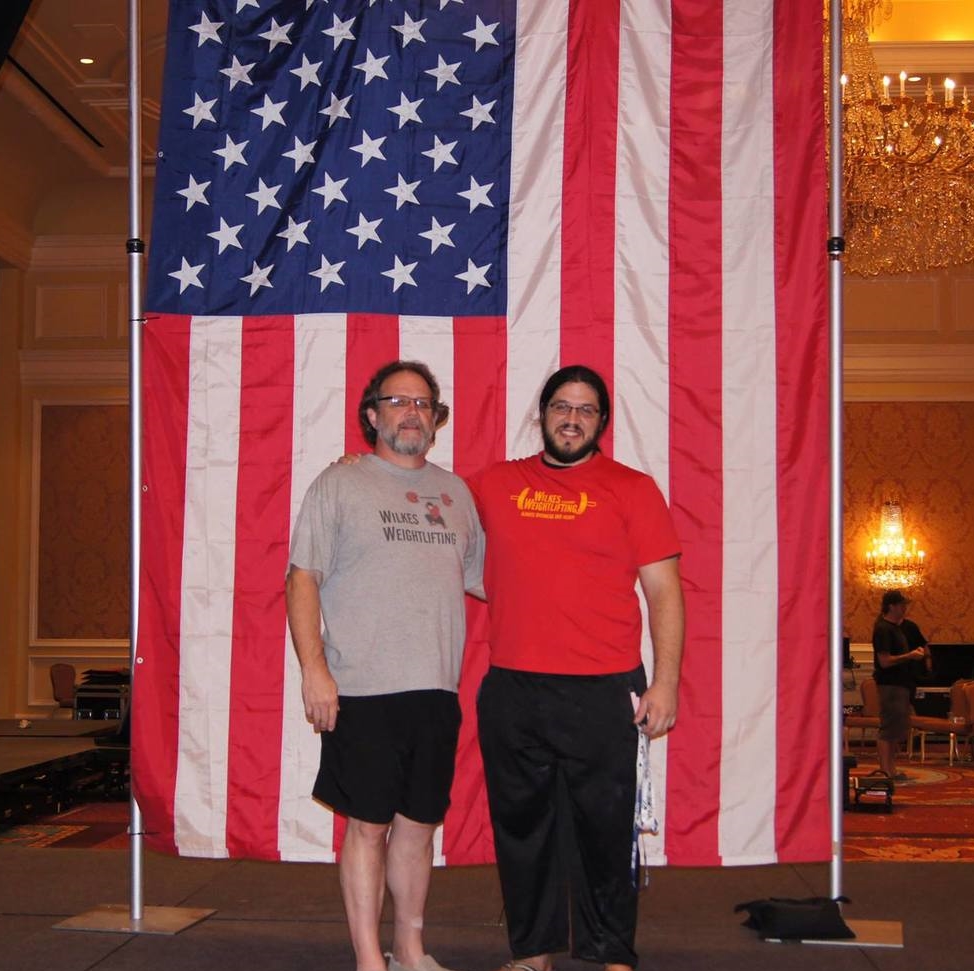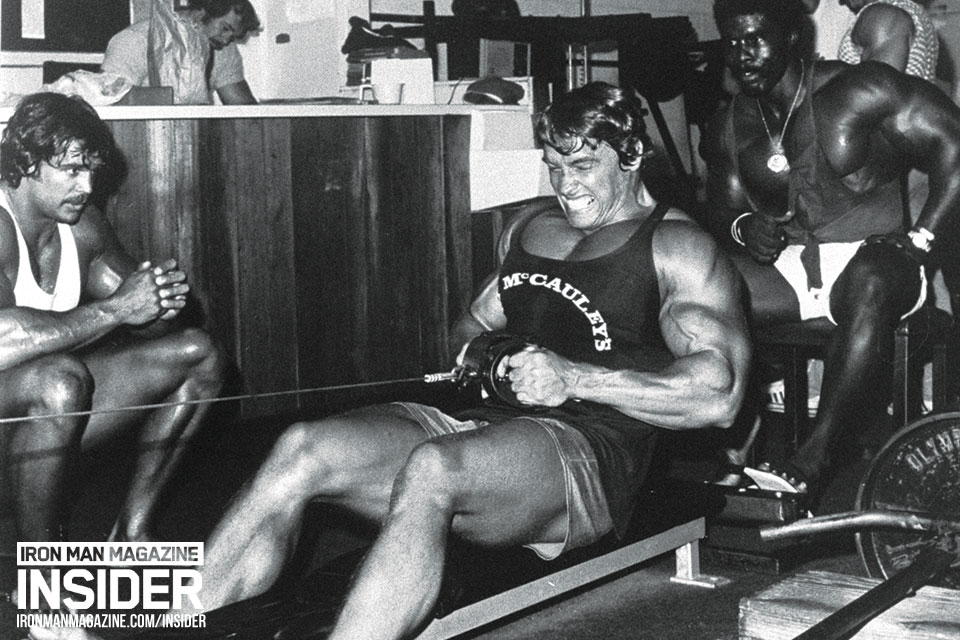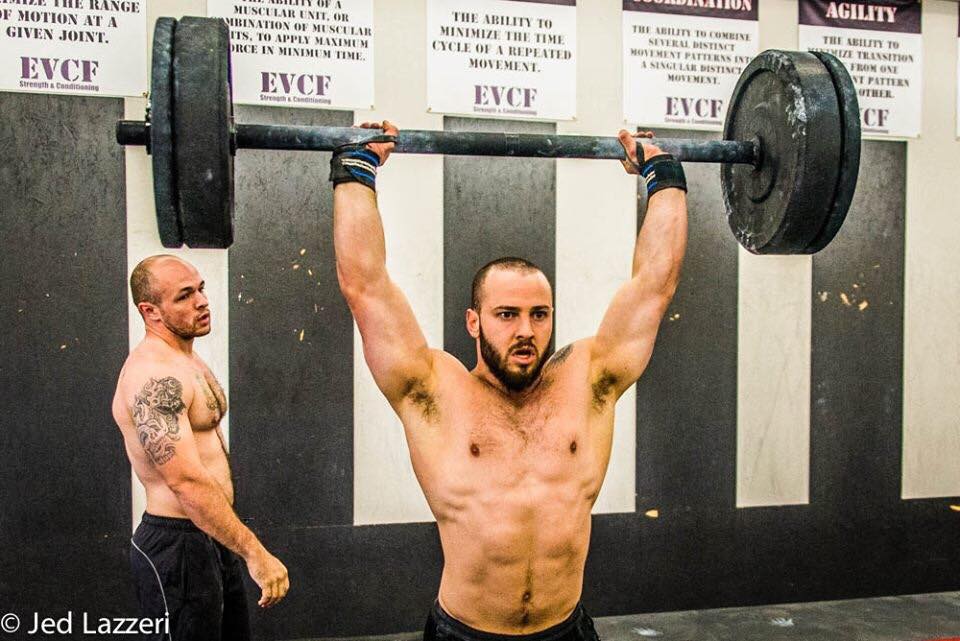For our readers who don’t know, please share a little of your background and coaching career.
I have been coaching the lifts for over 15 years; I started when my sons (4 of them) wanted to get better at football. I took them and a few other guys, and started training them at the local gym. Of course, they wouldn’t let us drop weights, so I needed a new place. I went to the high school sports facility and asked the coach if I could use the gym to work with some of the younger up and coming players. He suggested I come in with him; he wanted to see what I was teaching and learn, too, so I did. After that spring, the coach turned the weight training and conditioning program over to me. I also eventually picked up the track team training too.
As time went on I realized these guys were getting pretty strong, so I suggested we do some competitions. From there, we just kind of took off! The ones that really enjoyed it worked hard and continued to compete. My core group was my four sons, Kyle, Cody, Caine and Coard along with Kyle Ernst and his older brother Paul Ernst and Sasha Norfleet. With these guys, we did well in competitions.
Eventually we teamed up with OBX Weightlifting and picked up Jimmy Grier as a strong, young 62 kilo lifter. As Team OBX we grew stronger and better. We won a couple team awards and Coard Wilkes and Kyle Ernst became National Champions. But as things go, most of the guys graduated and moved on. So we returned home and became Wilkes Weightlifting. From there it was mostly my sons and a few lifters here and there that popped in for a while. Coard began to excel as well as Caine, so we continued on.
August tells me that you have a pretty unique approach to training. Could you describe it a bit and perhaps what makes it so different?
I do. I have found very few that coach as I do. Coaching is a natural thing for me, and unfortunately I feel sorry for many that call themselves coaches, and their lifters. Yeah that’s a hard thing to say, but the thing is that coaching isn’t yelling, having the best old timer stories, coming up with smart remarks, or being the most animated – it’s about taking time, lots of time, and effort to get the job done. Coaching to me is serious business; it’s about taking a life and making it better, changing a negative into a positive. Even in adult lifters that come to you, you often have to change their outlooks and confidence levels and ideals before they can truly achieve their goals. I like the challenge and I like to succeed, but I also acknowledge that my goals for a potentially good lifter may not be his/hers.
It appears many lifters squat almost if not every day. I don’t do this with my lifters. For younger lifters, two times a week is all they do. The more experienced and stronger lifters may go twice one week, once the next. Everyone talks about recovery, but not as many truly practice it. I throw rest and recovery in a lot more now for Caine with the huge amounts of weight he lifts, and every time I’ve found a new way to add recovery, he gets better. By rrecovery I mean not lifting nor squatting any. He may do core work or other accessory work but no lifting.
I believe in volume lifting for workouts not just a few heavy lifts each day that only prepares you to lift that weight each day. The body will easily fall into and get comfortable with a constant routine… We have a T-shirt (and will be getting a new one) that says “Chaos Under Control.” That is a huge rule of thumb for me in my training programming. Constantly changing (for the Crossfitters out there, “varied”). As I pointed out earlier, a constant routine breeds a constant result, hence lifters tend to plateau. Speaking of CrossFit, I have my lifters do some CrossFit-like routines as we near a meet. No, they won’t do kipping pull-ups or muscle-ups, but they borrow CrossFit’s affinity for constant movement. I usually do this with their core work—constant movement, no rest until completion. I also use bodybuilding as an integral part of our training.
I’ve seen so many videos or streams of training sessions where the coaches’ cues are “don’t do that,” “hey that’s wrong,” etc… those aren’t real coaching cues. You watch and then you teach.
I think I’ll stop there for now that’s enough of my secrets, Ha ha…
I’m always curious how the well-known weightlifting coaches built their reputations. How did you find athletes/how did athletes find you?
Well that takes a quick look at the younger Jr. and school age teams with a ton of lifters. When I was at the high school I had plenty of lifters available, but once I left and my guys picked their life paths, my team shrank, and it is hard to get the numbers back up when you can’t offer money or don’t already have a huge team. Programs working out of good, helpful schools– like what Harvey has down in Florida—are lucky in what they have. The high school that I worked at fought me every step of the way. When we owned a local CrossFit, it still was just personal training here and there, no one rushing to the door. Part of that is that these Level 1 trainers think they can coach but they have never done it, so instead of sending promising lifters to good coaches, they try it themselves.
So that brings me here. If you want to learn to lift or you want to get better at the lifts, find a coach, a real Olympic lifting coach, that is someone that took someone from nothing to a national level. Don’t go to a nobody or a national level lifter that says he/she is a great coach. They are great lifters, but it doesn’t always translate into being a great coach. They are two different worlds. My two cents. The only issue with what I just said is there are many national top level coaches out there that have quit teaching newbies; they only want to work with their seasoned athletes… I’ll take newbies all day long.
What about your career as a homicide detective? Was it difficult to balance that work with coaching? Did you see any skill sets that transferred between your occupations?
As I got more into coaching, I moved away from Homicide. It was after we started that my Father killed himself so I left and went into burglary to ease my schedule. But as a Homicide Detective you gotta listen. Everyone has this picture of cops telling, always telling. As a Detective you have to listen and let them talk, then you have them, and I’m real good at letting someone run their mouth and dig their own hole. I use that with my lifters: let them talk, and I listen and learn about them. I use their beliefs. Detectives also have to ask the right questions, just like a coach. If I feel that a lifter is covering something up, say an injury, I ask again in another way, and watch his/her response. Detectives are trained observers who watch for any subtle differences, and that applies to good coaches as well.
Caine also tells me that you’re an ordained minister. What role would you say that has played in your life?
Yes I am. It has made me a better person, not to offend any non-believers, but I think almost any religion helps. If a person only adhered to the last six commandments, he would be a better person and treat others better. With that said I think all ten round you out way better.
Ministering is teaching, assisting, helping, and again listening… the word itself means servant so if you want to know if a minister is good or not- watch him to see how well he serves, not just running his mouth.
Tell me about the seminars offered by Wilkes Weightlifting. Weightlifting seminars have become so popular in recent years. What can people expect from yours?
I have talked to many at my seminars and they tell me of other seminars they have attended. We teach weightlifting at ours. It’s not a cheering session, we aren’t trying to hype you up and get you PRs. We want to leave you with real information and cues that you can use to get better. We teach drills and assistance lifts and movements that develop technique and build confidence. It’s not normal to jump right under heavy weight, so you need to build that confidence so that it becomes natural.
We use lectures, diagrams, demonstrations, and practical hands-on sessions to get the message across to our participants. We give them the ingredients; it’s up to them to bring the desire and effort to put everything together and get better.
What are your favorite tools/techniques/drills for training beginners?
Squatting is the foundation of the lifts. Beginners need to be able to squat. I won’t let a person attempt a lift at all until he/she can do overhead squats efficiently. Young lifters need total body conditioning and strengthening. Once they can do the lifts, I program their lifts first and then upper body dumbbell routines for additional strength—sort of bodybuilding. Snatches and cleans from a dead hang are big assistance lifts for me. Even with able lifters you can never have too much basic training to keep your technique working.
What would you say you are most proud of in your coaching career? (Please, brag!)
I am proud of the young men I coached, whether they are in the sport anymore or not. They have all made something of themselves and are good, solid, honest men that you can trust and look up to.
Do you have any particular goals that you’re working towards, personally or professionally?
Personally I need to get better, you can always improve- and that is across the board in all phases of life I can do better, so I need to.
Professionally- I’d love to get a job making a living doing what I love to do, and that’s coaching.
You can find Chris at Wilkes Weightlifting
And check out our past interviews with Chris’s athletes and Iron Athlete team members Caine Wilkes and Kyle Ernst
Read about Caine’s performance at the Arnold alongside Iron Athlete teammates Alex Lee and Norik Vardanian here



